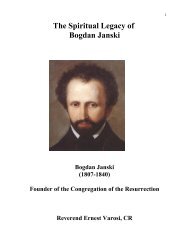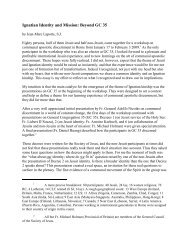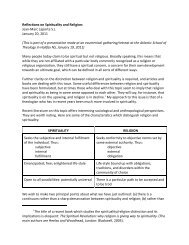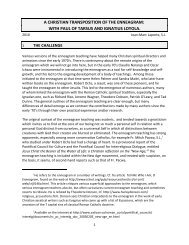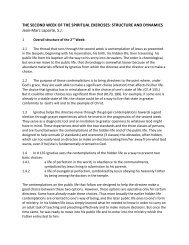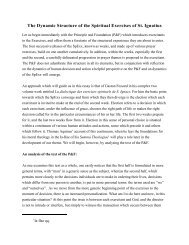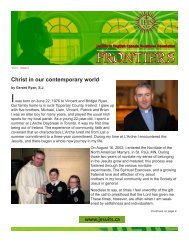Understanding the spiritual journey: from the classical tradition to the ...
Understanding the spiritual journey: from the classical tradition to the ...
Understanding the spiritual journey: from the classical tradition to the ...
You also want an ePaper? Increase the reach of your titles
YUMPU automatically turns print PDFs into web optimized ePapers that Google loves.
Exercises. The second is contemplative prayer, in which <strong>the</strong> mind rests in a penetrating andsynoptic gaze, akin <strong>to</strong> <strong>the</strong> type of prayer proposed by Ignatius for <strong>the</strong> second week. The third isa prayer of ecstasy, of being <strong>to</strong>tally drawn out of oneself in<strong>to</strong> God. As one moves in<strong>to</strong> <strong>the</strong> thirdand fourth week of <strong>the</strong> Exercises, Ignatian contemplation naturally leads <strong>to</strong> more frequentunitive moments, as one seeks <strong>to</strong> unite oneself with Christ in his sorrow (3 rd week) and his joy(4 th week). In <strong>the</strong> fourth phase, persons go out in compassion, a compassion that brings <strong>the</strong>min<strong>to</strong> <strong>the</strong> hurly burly of daily existence. It is <strong>the</strong> descent <strong>from</strong> <strong>the</strong> mount of transfiguration, adescent <strong>to</strong> which Jesus invited his favourite apostles. This may feel like a return <strong>to</strong> distraction<strong>to</strong> <strong>the</strong> one with some experience of union, but this compassion is grounded in a deep andabiding relationship with God. 16 If I contemplate God and admire his compassion, what else is<strong>the</strong>re <strong>to</strong> do but <strong>to</strong> imitate that compassion?2.1.3 The third row focuses on <strong>the</strong> scriptural <strong>the</strong>me of thirst (e.g. Ps 42), but whereas ra<strong>the</strong>rthan thirsting for God as one does in <strong>the</strong> first three stages, in <strong>the</strong> fourth stage one begins <strong>to</strong>thirst as God thirsts, in compassion for broken creation and sinful humanity which needshealing. This reversal is attested in scripture as well, in Jesus’ cry on <strong>the</strong> cross, “I thirst”. InJesus God really thirsts for us. Ra<strong>the</strong>r than labouring <strong>to</strong> find God, in this fourth stage I allowGod <strong>to</strong> labour through me, and I share in his labour.2.1.4 In <strong>the</strong> compassion column of row four, Richard speaks of fruitfulness. I have put thispoint in a more contemporary perspective in which <strong>the</strong> fruitfulness of marital intimacy is seenas more than <strong>the</strong> physical begetting of children.2.1.5 The last two members of <strong>the</strong> fifth row show Richard’s creativity. First he is adding aspecifically Chris<strong>to</strong>logical note here by alluding <strong>to</strong> <strong>the</strong> death and resurrection, and using <strong>the</strong>language of emptying out. The underlying text is that of Philippians: “Though He was in <strong>the</strong>form of God, he did not consider his equality with God something <strong>to</strong> be exploited, but heemptied himself out, taking <strong>the</strong> form of a slave...” (Phil 2:6-7). Humans who have reached <strong>the</strong>third degree, that of union, find <strong>the</strong>ir selves absorbed in<strong>to</strong> God, and in that sense die <strong>to</strong> selfand are found in <strong>the</strong> form of God. But just as Jesus did not remain in <strong>the</strong> form of God, butemptied himself out taking <strong>the</strong> form of a servant, and chose <strong>to</strong> live in our world of struggle,violence, ambiguity, so <strong>to</strong>o <strong>the</strong> one who reaches union is invited <strong>to</strong> move beyond in selfemptyingand compassion. In doing so he more deeply reassumes his human self astransformed by God’s own perspective. For him God is no longer simply seen as object of hisdesire. God dwells in him and in him desires salvation for every human being.16 That can raise an important question for my self-examination, one <strong>to</strong> which <strong>the</strong> answer is notalways clear. My supposed compassion may be a form of activism by which I distract myself <strong>from</strong> Godand <strong>the</strong> things of God, or else it may be <strong>the</strong> genuine fruit of my <strong>spiritual</strong> <strong>journey</strong> and whatever unionwith God I have experienced.



